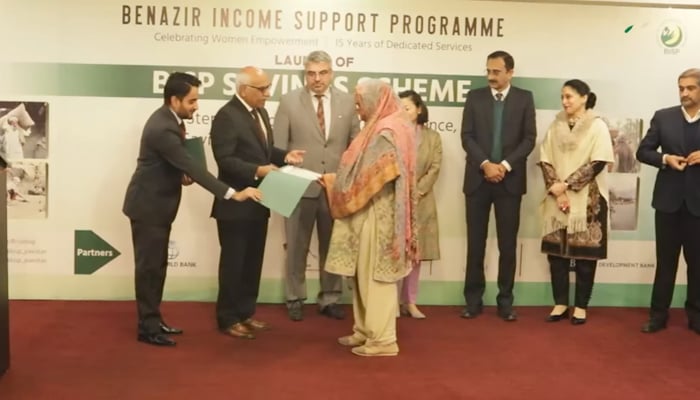BISP Savings Scheme aims to instil financial independence
Islamabad:The Government of Pakistan, with the technical support of global development partners, marked a significant milestone with the launch of the Hybrid Social Protection Scheme called ‘BISP Savings Scheme’ under the Benazir Income Support Programme.
The event, held in Islamabad, witnessed the participation of distinguished representatives from the World Bank, Asian Development Bank, UNICEF, GIZ, German Corporation, and senior government officials.
On this occasion, Chairperson BISP, Dr. Muhammad Amjad Saqib addressed the ceremony, officially introducing the BISP Savings Scheme. Dr. Amjad Saqib highlighted the program's primary objective, stating, "The BISP Savings Scheme aims to instill financial independence and a savings habit among consumers, fostering resilience during times of economic uncertainty."
This initiative targets the informal sector, often referred to as the 'missing middle,' lacking access to social welfare schemes. Dr. Muhammad Amjad Saqib emphasized that families benefiting from BISP and individuals with a 40 PMT score would be eligible to participate in the scheme, catering to those traditionally underserved by social protection interventions.
Dr. Amjad Saqib said that BISP Savings Scheme encourages financial inclusion, as subscribers will open and maintain savings accounts. This connection to the conventional banking system enables access to additional services such as micro-finance and insurance, he added.
Chairperson BISP said that consumers are required to save a portion of their income in their savings accounts, with the government pledging to contribute an additional forty percent of consumer savings. Both men and women are eligible to apply, and the scheme initially aims to benefit one hundred and fifty thousand people, he continued.
Dr. Amjad Saqib expressed gratitude to all development partners for their technical and financial support in preparing and launching the BISP Saving Scheme, urging the public to join this transformative initiative.
In the opening remarks, Dr. Tahir Noor, Additional Secretary BISP and DG NSER Mr. Naveed Akbar, outlined the pilot phase's launch locations, covering Gilgit-Baltistan (Gilgit and Astor), Azad Jammu and Kashmir (Muzaffarabad and Neelum), Khyber Pakhtunkhwa (Peshawar and Lucky Marwat), Punjab (Lahore and Multan), Balochistan (Quetta and Qila Saifullah), Sindh (Karachi and Sukkur), and the Federal Capital (Islamabad). Dr. Noor emphasized the importance of regular savings for consumers, asserting that these funds would prove valuable in challenging situations.
During the momentous occasion, key representatives and experts from global development organizations shared their invaluable insights on the BISP Savings Scheme and the broader spectrum of Digital and Financial Literacy for women in need under the Benazir Income Support Programme.
Ms. Melis Guven, Lead Economist at the World Bank, Mrs. Lena Paust, First Secretary for German Development Cooperation, and Ms. Sofia Shakil, Director of Human and Social Development at the Asian Development Bank, emphasized the significance of financial empowerment. Mr. Cem Mete, Practice Manager of the Social Protection and Jobs Global Practice, South Asia Region, World Bank, and Ms. Johanna Knoess, Head of Project at GIZ, provided expert perspectives on the transformative potential of the BISP Savings Scheme.
Dr. Fahmida Iqbal, Gender Advisor at UNICEF, and Mr. Shahzad Nawaz Cheema, Joint Secretary of Poverty Alleviation and Social Safety Division, contributed valuable thoughts on the role of Digital and Financial Literacy in enhancing the lives of vulnerable women within the BISP framework. Together, they collectively termed this initiative as a significant milestone in the journey towards financial inclusion and social upliftment. Certificates were distributed to women who participated in the savings scheme through the BISP portal, recognizing their commitment to financial empowerment.
-
 Shamed Andrew Wants ‘grand Coffin’ Despite Tainting Nation
Shamed Andrew Wants ‘grand Coffin’ Despite Tainting Nation -
 Keke Palmer Reveals How Motherhood Prepared Her For 'The Burbs' Role
Keke Palmer Reveals How Motherhood Prepared Her For 'The Burbs' Role -
 King Charles Charms Crowds During Lancashire Tour
King Charles Charms Crowds During Lancashire Tour -
 ‘Disgraced’ Andrew Still Has Power To Shake King Charles’ Reign: Expert
‘Disgraced’ Andrew Still Has Power To Shake King Charles’ Reign: Expert -
 Why Prince William Ground Breaking Saudi Tour Is Important
Why Prince William Ground Breaking Saudi Tour Is Important -
 AOC Blasts Jake Paul Over Bad Bunny Slight: 'He Makes You Look Small'
AOC Blasts Jake Paul Over Bad Bunny Slight: 'He Makes You Look Small' -
 At Least 53 Dead After Migrant Boat Capsizes Off Libya
At Least 53 Dead After Migrant Boat Capsizes Off Libya -
 'God Of War' Announces Casting Major Key Role In Prime Video Show
'God Of War' Announces Casting Major Key Role In Prime Video Show -
 Real Reason Prince William, Kate Broke Silence On Andrew Scandal Revealed
Real Reason Prince William, Kate Broke Silence On Andrew Scandal Revealed -
 Drew Barrymore Responds To 'Charlie's Angels' Costar's Comments About Her
Drew Barrymore Responds To 'Charlie's Angels' Costar's Comments About Her -
 Shakira Slips Hard On Stage During Life Show
Shakira Slips Hard On Stage During Life Show -
 King Charles Speaks Out Over Andrew's Scandal: 'Stand Ready To Help Police'
King Charles Speaks Out Over Andrew's Scandal: 'Stand Ready To Help Police' -
 Dax Shepard Recalls Horrifying Accident That Almost Killed Him
Dax Shepard Recalls Horrifying Accident That Almost Killed Him -
 Logan Paul's Bodyguard Hits Fan On Super Bowl Day
Logan Paul's Bodyguard Hits Fan On Super Bowl Day -
 Epstein Files: Anne Hathaway Mentioned As Highly Desired Guest For Bill Gates?
Epstein Files: Anne Hathaway Mentioned As Highly Desired Guest For Bill Gates? -
 Prince Harry Under A Lot Of Stress As Meghan Markle Makes Bizarre Demands
Prince Harry Under A Lot Of Stress As Meghan Markle Makes Bizarre Demands




